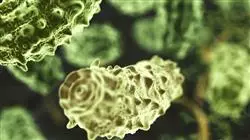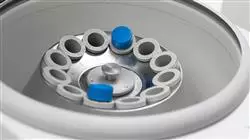University certificate
The world's largest faculty of medicine”
Description
Update your knowledge in the latest techniques and work systems in Microbiology and Parasitology Laboratory in the clinical analysis laboratory, with the most efficient teaching system on the market"

Since Anton van Leeuwenhoek discovered the first microscope, the techniques for the analysis of clinical samples have evolved in leaps and bounds, so much so that today we have a wide variety of analytical procedures, which have become increasingly important for the diagnosis and prevention of pathologies in the biomedical sciences.
Therefore, given the molecular variability of diseases in the population, clinical analyses are necessary and thus have a leading role in medical personnel's clinical decision making and in turn, as a link to medicine based on scientific evidence.
Another of the aspects covered in this course is the specialty of Clinical Analysis, with an eminently multidisciplinary character, and it is the students themselves who must focus on those aspects in which they are lacking training, depending on their educational background.
In addition, the study of Microbiology and Parasitology is essential in the daily practice of a Clinical Analysis Laboratory. Microorganisms and parasites are causative agents of a wide variety of pathologies. It is also important to bear in mind that many of these microbial agents make up a large part of the normal microbiota of healthy individuals, exerting numerous benefits when there is a balance. The interpretation of the results obtained in the microbiology laboratory depends on the quality of the samples received, as well as the knowledge and experience of the microbiologist, with sample processing being a critical step for the accuracy of the results.
A compendium and deepening of knowledge that will lead you to excellence in your profession.
With this Microbiology and Parasitology Laboratory you will be able to combine high intensity training with your personal and professional life, achieving your goals in a simple and real way”
This Postgraduate diploma in Microbiology and Parasitology Laboratory offers you the characteristics of a high-level scientific, teaching, and technological course. These are some of its most notable features:
- Latest technology in online teaching software
- Highly visual teaching system, supported by graphic and schematic contents that are easy to assimilate and understand
- Practical cases presented by practising experts
- State-of-the-art interactive video systems
- Teaching supported by telepractice
- Continuous updating and recycling systems
- Self-regulating learning: full compatibility with other occupations
- Practical exercises for self-evaluation and learning verification
- Support groups and educational synergies: questions to the expert, debate and knowledge forums
- Communication with the teacher and individual reflection work
- Content that is accessible from any fixed or portable device with an Internet connection
- Supplementary documentation databases are permanently available, even after the course
A highly skilled course which will allow you to become a highly competent professional in hematology in a clinical analysis laboratory”
The teachers of this course are professionals currently working in a modern and accredited Clinical Laboratory, with a very solid training base and up to date knowledge in both scientific and purely technical disciplines.
In this way, we ensure that we provide you with the most innovative training we are aiming for. A multidisciplinary team of professionals trained and experienced in different environments, who will cover the theoretical knowledge in an efficient way, but, above all, will put the practical knowledge derived from their own experience at the service of the course: one of the differential qualities of this course.
This mastery of the subject is complemented by the effectiveness of the methodology used in the design of this course in Microbiology and Parasitology Laboratory. Developed by a multidisciplinary team of experts, it integrates the latest advances in educational technology. This way, you will be able to study with a range of comfortable and versatile multimedia tools that will give you the operability you need in your training.
The design of this program is based on Problem-Based Learning: an approach that conceives learning as a highly practical process. To achieve this remotely, we will use telepractice: with the help of an innovative interactive video system, and learning from an expert, you will be able to acquire the knowledge as if you were actually dealing with the scenario you are learning about. A concept that will allow you to integrate and fix learning in a more realistic and permanent way.
The learning in this Postgraduate diploma is developed through the most developed didactic methods in online teaching to guarantee that your efforts produce the best results possible"

The learning in this Postgraduate diploma is developed through the most developed didactic methods in online teaching to guarantee that your efforts produce the best results possible"
Objectives
The objective of this training is to offer professionals who work in clinical analysis laboratories, the necessary knowledge and skills to perform their duties using the most advanced protocols and techniques of the moment. Through a study plan totally adapted to the student, this Postgraduate diploma will progressively allow you to acquire the skills that will push you towards a much higher professional level.

Learn from the best and study the techniques and work procedures of Clinical Analysis to be bale to work in the best laboratories in the field”
General Objectives
- Evaluate the ISO standards of a clinical laboratory
- Demonstrate the importance of good safety and sanitary waste management
- Identify the need for correct management of health documentation
- Present why quality control is obligatory in a clinical laboratory
- Define the clinical indicators of analytical quality
- Identify clinical decision levels within reference ranges
- Define scientific method and its relationship with medicine based on scientific evidence
- Analyze and carry out the instrumental techniques and sample collection processes that specifically apply to medical clinical analysis laboratories as well as understanding the basics and the correct management of the necessary instruments
- Apply the instrumental techniques in the resolution of problems in health analysis
- Gain specialized knowledge to carry out the tasks specific to a clinical analysis laboratory in terms of the implementation of new analytic methods and the monitoring the quality of those already implemented
- Define the procedures used in clinical analysis laboratories for the use of different techniques as well as for sample collection and those aspects related to validation, calibration, automization and processing of the information obtained from the procedures
- Examine the etiological, pathogenic, epidemiological, treatment and diagnostic bases of the main microbial and parasitic diseases affecting human beings
- Apply the acquired knowledge to the control of transmittable infectious diseases, both in the hospital and the out-of-hospital environment
- Acquire appropriate skills to select the correct diagnostic method with the consequent preparation of a report on the efficiency of the techniques employed
- Develop specialised knowledge to carry out a good organization and management of the services in a microbiology clinic. Coordinate activities and teams, and adapt them to the needs and resources available
- Acquire advanced epidemiological knowledge to anticipate and avoid the factors that cause or condition the acquisition of infectious diseases
- Gain skills to work in a clinical laboratory, research or teaching team, recognising the specific responsibilities needed in each speciality field
- Provide advanced, specialized, multidisciplinary and up-to-date training, with an academic and scientific approach, oriented to a career in the clinical field or as a professional in R&D
Specific Objectives
- Define workflows within a clinical analysis laboratory
- Identify the evacuation plan during a health emergency
- Develop the types of sanitary waste
- Present the need for process management
- Develop the administrative procedure for health documentation
- Identify the types of health inspections
- Defining ISO accreditations within the framework of an audit
- Develop reference intervals through validation guidelines
- Analyze the steps of the scientific method
- Present scientific evidence levels and their relation with clinical analysis
- Compile the instrumental techniques used in a clinical analysis laboratory
- Determine the procedures involved in microscopic, microbiological, spectral, molecular biology, separation and cell counting techniques
- Develop the fundamental theoretical concepts for the understanding of in-depth instrumental techniques
- Establish the direct applications of instrumental techniques of clinical analysis in human health as a diagnostic and preventive element
- Analyze the process prior to the use of the instrumental techniques to be developed in the clinical analysis laboratory
- Justify the rationale for using one practice over another based on diagnostic, staffing, management and other factors
- Propose a practical learning of instrumental techniques through the use of clinical cases, practical examples and exercises
- Evaluate the information obtained from the use of instrumental techniques for the interpretation of results
- Acquire advanced knowledge in Clinical Microbiology and Parasitology. Study the main infectious diseases of clinical interest
- Identify disease-causing microorganisms in humans, to understand the pathophysiology and to practice detection and diagnostic techniques within a framework of responsibility and health safety
- Organize the preparation of necessary material for its use in the Microbiology laboratory and check for sterility when appropriate. Know the basis and operation of any culture environment in order to use it to perform the different tests used in the microbiology laboratory
- Correctly handle the different apparatus and equipment used in the Microbiology laboratory
- Establish a proper functioning through a registration system for sample collection and processing
- Design specific work protocols for each pathogen, selecting the appropriate parameters for its correct diagnosis, based on criteria of effectiveness and efficiency
- Interpret antimicrobial or antiparasitic sensitivity in order to provide the best treatment
- Know the new techniques used for the identification of pathogens
- Establish proper communication between the laboratory and the clinic
- Promote and monitor compliance with internal and external quality controls and safety standards

A boost to your CV that will give you the competitiveness of the best prepared professionals in the labor market"
Postgraduate Diploma in Laboratory Microbiology and Parasitology
Curious fact: on the cell phone screen or computer keyboard you are using right now to access this information, there can be 30 times more germs than on a clean toilet seat; up to 450 different types of microorganisms are capable of agglutinating on these tactile tools according to a report by the Foundation of Studies for Health and Social Security (FESS) and the University of Barcelona. We live with microbial agents all the time: some are harmless, others trigger multiple pathologies. For this reason, at TECH we present the Postgraduate Diploma in Microbiology and Parasitology Laboratory: an online course that covers everything from the parameters and instrumental techniques used in clinical analysis laboratories to the classification, study and diagnostic methods of the different bacterial, fungal and viral agents and the infections they cause. If you are looking for a way to add unique competencies to your curriculum and diversify your field of action by combining science and medicine, this Expert is for you.
Become a laboratory microbiologist
How indispensable are microbiology, parasitology and virology as you will find in our program? Let's talk about historical contexts and practical examples: before 1954 polio killed half a million people annually, after 1954 the Salk polio vaccine was developed and mass-produced, saving millions of lives. Such an event was possible using cell culture techniques: a procedure that you can learn in the Expert content we offer you. We also have a group of professors with extensive experience in the field of medical biology, so you will acquire knowledge directly from personnel who have worked in the sector. You will also learn other areas related to the field such as proteomics and genomics, molecular biology techniques in clinical analysis, immunoanalysis, among other highly fascinating particularities that will be of great help to you at a practical level. Because we know that working in a laboratory is fascinating, at TECH we prepare you to live a personally and professionally enriching experience.







